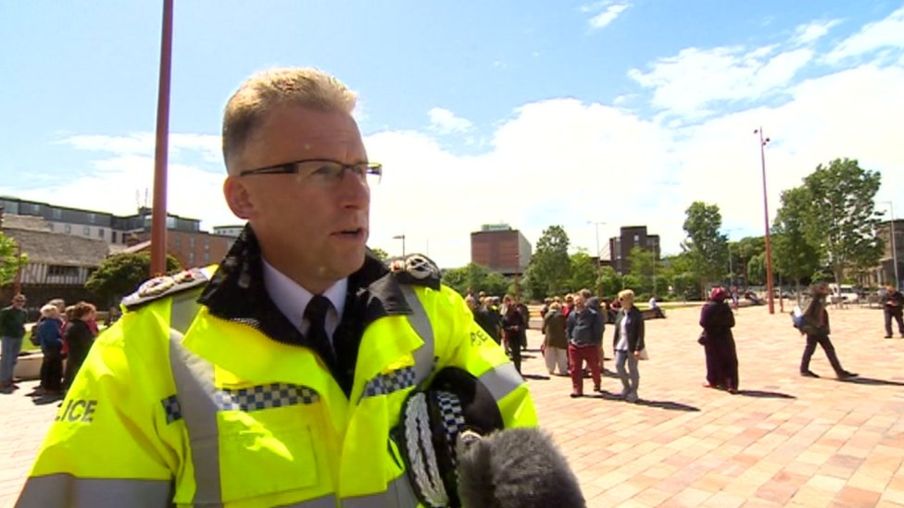
BBC (27 December 2016)
A senior police officer has called the government's Prevent anti-extremism programme "absolutely fundamental" in countering terrorism in the UK.
The programme has been criticised by MPs, the National Union of Teachers and the Muslim Council of Britain.
But Leicestershire Chief Constable Simon Cole said it was sometimes wrongly presented in "hysterical" terms as a spying operation.
It was for those needing help and support, he told the Press Association.
Around 7,500 referrals were made to the Prevent scheme last year to try to tackle home-grown extremism - the equivalent of 20 each day.
The period included the introduction of a new counter-extremism duty, requiring public bodies to stop people being drawn into terrorism, which took effect in July last year.
Of the people referred to the scheme, set up in the wake of the 7/7 bombings in London, 10% were deemed to have a vulnerability to terrorism and were referred to Prevent's Channel programme, aimed at those at risk of radicalisation.
Those found to be vulnerable but not at risk of involvement in terrorism amounted to 25%.
No action was taken with 37% of the referrals and 28% are still being considered.
Rise in far-right
Of cases where an ideology was recorded, just over half related to Islamist extremism, whilst nearly one in 10 were linked to far-right extremism.
Mr Cole, who is the National Police Chiefs' Council lead for Prevent, said far-right tendencies had increased in some areas of the country, adding that they were "typically about people who want to do things that destabilise communities".
He believed the programme was working, despite criticism and calls for it to be reviewed by educational and religious organisations, as well as politicians.
He cited the case of a young man from the north of England who was identified as expressing right-wing views, which worried people who knew him.
He was referred to Prevent and a programme was put in place were he met people from other races and backgrounds through football.
Mr Cole said this changed some of the man's thinking about those groups, adding: "As a consequence of which, that person is probably a better citizen than they were at the start of the programme."
In another case, a young man in the Midlands started talking about going to Syria to fight and was referred to Prevent.
According to Mr Cole, "A programme was put around him about understanding why he was thinking what he was thinking, about explaining to him other ways that he could perhaps express dissatisfaction with policy and what he saw going on in the world."
The man did not go to Syria. "A couple of his mates did and they are dead," Mr Cole added.
'Try and divert'
Mr Cole said criticism of Prevent was unfair and was based on "perceptions" rather than the work they did.
"We try and divert, allow people the opportunity to help them make better decisions," he said. "It's absolutely fundamental.
"It has enabled us to try and help stabilise communities and stop people getting us into a cycle of aggravation."
However, he accepted that some communities were suspicious of the programme and that it needed to be a transparent process to gain their trust.
The duty introduced last year requires organisations such as schools and councils to "have due regard to the need to prevent people from being drawn into terrorism".
The scheme also claims to have played a major role in stopping more than 150 attempted journeys to the conflicts in Iraq and Syria.
A recent internal Home Office review of Prevent recommended it should be strengthened.
No comments yet.
- ALL EYES ON EWG MEETING ON JANUARY 12 The Balkans 27.12.2016
- AFGHANISTAN FUNDS ABUSIVE MILITIAS AS US MILITARY 'IGNORES' SITUATION, OFFICIALS SAY Asia - Pacific 27.12.2016
- ARMENIAN MINISTER EXPECTS REMITTANCES FROM RUSSIA TO GROW BY 4-5 PERCENT NEXT YEAR The Caucasus and Turkish-Armenian Relations 27.12.2016
- UKRAINE HINTS CONFLICT WITH RUSSIA LED IT TO BACK UN MEASURE Asia - Pacific 27.12.2016
- RUSSIA, KAZAKHSTAN TO SIGN BAIKONUR COSMODROME COOPERATION DEAL IN ST.PETERSBURG Asia - Pacific 27.12.2016
-
25.01.2016
THE ARMENIAN QUESTION - BASIC KNOWLEDGE AND DOCUMENTATION -
12.06.2024
THE TRUTH WILL OUT -
27.03.2023
RADİKAL ERMENİ UNSURLARCA GERÇEKLEŞTİRİLEN MEZALİMLER VE VANDALİZM -
17.03.2023
PATRIOTISM PERVERTED -
23.02.2023
MEN ARE LIKE THAT -
03.02.2023
BAKÜ-TİFLİS-CEYHAN BORU HATTININ YAŞANAN TARİHİ -
16.12.2022
INTERNATIONAL SCHOLARS ON THE EVENTS OF 1915 -
07.12.2022
FAKE PHOTOS AND THE ARMENIAN PROPAGANDA -
07.12.2022
ERMENİ PROPAGANDASI VE SAHTE RESİMLER -
01.01.2022
A Letter From Japan - Strategically Mum: The Silence of the Armenians -
01.01.2022
Japonya'dan Bir Mektup - Stratejik Suskunluk: Ermenilerin Sessizliği -
03.06.2020
Anastas Mikoyan: Confessions of an Armenian Bolshevik -
08.04.2020
Sovyet Sonrası Ukrayna’da Devlet, Toplum ve Siyaset - Değişen Dinamikler, Dönüşen Kimlikler -
12.06.2018
Ermeni Sorunuyla İlgili İngiliz Belgeleri (1912-1923) - British Documents on Armenian Question (1912-1923) -
02.12.2016
Turkish-Russian Academics: A Historical Study on the Caucasus -
01.07.2016
Gürcistan'daki Müslüman Topluluklar: Azınlık Hakları, Kimlik, Siyaset -
10.03.2016
Armenian Diaspora: Diaspora, State and the Imagination of the Republic of Armenia -
24.01.2016
ERMENİ SORUNU - TEMEL BİLGİ VE BELGELER (2. BASKI)
-
AVİM Conference Hall 24.01.2023
CONFERENCE TITLED “HUNGARY’S PERSPECTIVES ON THE TURKIC WORLD"









